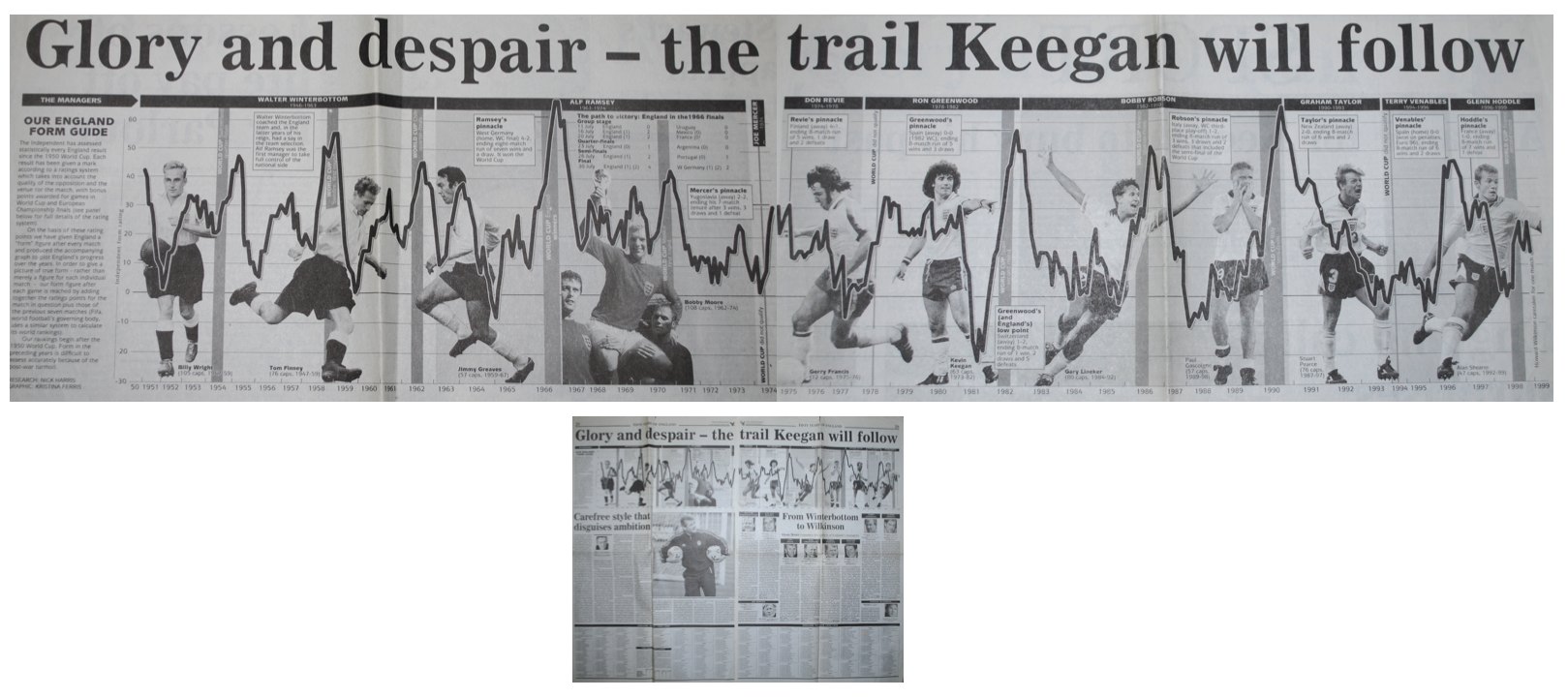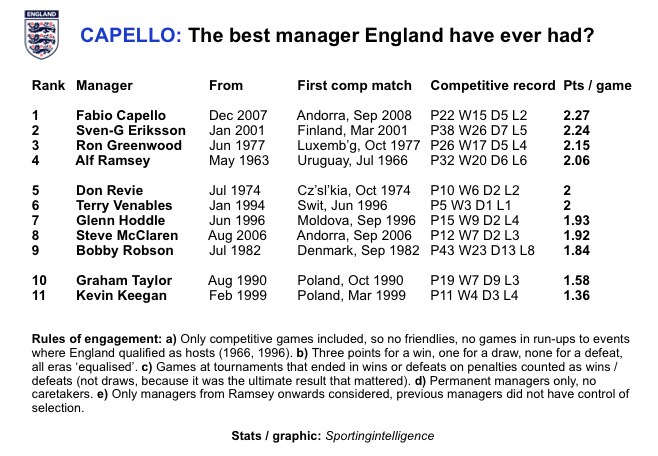By Nick Harris
SJA Internet Sports Writer of the Year
9 October 2011
In early 1999 when Glenn Hoddle’s time as England manager came to an end in the wake of ‘them things’ that he said about reincarnation, the FA hired Kevin Keegan and the Three Lions rollercoaster was set fair for its latest lurch of fortunes.
I was at The Independent at the time, where Richard Williams (@rwilliams1947) was the chief sports writer, and Glenn Moore (@GlennMoore7) was the chief football correspondent. I was the sports news correspondent and sometime statto.
Glenn and our editor wondered if it would be possible, statistically, to assess how steeply England’s rollercoaster had climbed and fallen in the previous 50 years.
What was England’s greatest achievement, objectively assessed? And what was the nadir? Which managers had outdone themselves? And which had just not done very well?
Over a number of weeks we devised a formula that alloted a value to every single England result since 1950 – many hundreds of them.
We considered the strength of the opposition, and took into account whether the match was a friendly or a competitive game.
We weighted the results depending on whether the match was a home game or away or played on neutral ground, and further importance was added if a match was played during the finals of a major competition, ie: at a World Cup or European Championships.
We were then able to rate England at any given point in time on a rolling basis by adding the scores from the previous string of games. (We settled on eight-game rolling periods to reflect approximately a year’s action).
We plotted England’s fortunes from 1950 to 1999 to form a rollercoaster graph, which was printed across the top of two full broadsheet pages.
The finished graph was as below (click to enlarge), and below it is a small inset of how the whole spread looked.
Glenn wrote profiles of all the England managers until then. We carried every England result since 1950 and our score for each result.
And of the finished graph, Richard wrote: “It looks like the cardiogram of an incurable manic depressive – and some might say that the diagnosis could hardly be more accurate.
“The team’s progress through the last half-century has been a stomach-churning alternation of elation and despair, with limited opportunities for the in-between emotions such as guarded optimism and low-grade depression.”
Article continues below …
England’s ‘peak’, it turned out, perhaps unsurprisingly, was the World Cup win of 1966, and many of the ups and downs on the stats-based graph felt intuitively right.
England’s semi-final at the 1990 World Cup was another high, followed by the 1982 World Cup when England went home after the second group stage, but unbeaten after five games: three wins and two draws against some of the world’s best teams.
The 1986 World Cup quarter-final was rated as a higher achievement than the Euro96 semi-final (on home turf), and that Euro 96 semi, in turn, was better than Hoddle’s England getting sent home from France 98 after the first knockout round.
Graham Taylor’s tenure was pretty much one long low spell (despite apparently good initial results), but then Bobby Robson also had his down times between his twin peaks of 1986 and 1990.
England’s low point, ever, we reckoned, arrived in May 1981, during Ron Greenwood’s reign, when his team lost 2-1 in Switzerland to cap an eight-match run of just one win, two draws and five defeats, including to the Swiss, Romania and Scotland.
What ultimately matters, of course, is getting to major tournaments and then doing as well as possible. Competitive games are the be all and end all. The rest is froth.
On that basis, I’ve re-examined the records of every England manager since Sir Alf Ramsey considering only their competitive matches (see table below for full details).
Sven Goran Eriksson fares very well, with 2.24 points per game from his 38 competitive matches in charge, during which time England qualified for all three tournaments he was attempting to reach: the World Cups of 2002 and 2006, and Euro 2004. Only Bobby Robson of all England’s other managers has ever qualified for as many as three major tournaments.
Sir Alf’s England qualified for two tournaments under his control; the 1968 Euros and the 1970 World Cup, with no qualifying needed for ’66 as hosts. He failed in attempts to get to three other major championships, including the 1974 World Cup.
Sir Alf, with 2.06 points per competitive England game, is among England’s top four managers, with Greenwood immediately above him (2.15 points) and Eriksson above that, on 2.24 points. (Using three points for a win in all eras).
At the bottom of the heap is Keegan (1.36 points per game) and then Graham Taylor (1.58 points). They have been the outstanding under-achievers, with five managers in the ‘middle’ bracket above them: Don Revie, Terry Venables, Glenn Hoddle, Steve McClaren and Bobby Robson.
But top of the pile on this measurement of average points per competitive game is … Fabio Capello, with 2.27 points per game from 22 matches that have included 15 wins, five draws and two defeats, one of which was against Ukraine after England had already qualified for the 2010 World Cup.
The other defeat, of course, was against Germany in South Africa, in one of the games that mattered most of all. But a single meaningful competitive defeat in 22 games isn’t so bad, not in the context of England’s rollercoaster, inevitable only in its twists and turns, pretty much whoever is in charge.
Subjectively, of course, the best manager is the one who wins the biggest prize. On that count, it would have to be Sir Alf for 1966 and then Sir Bobby for coming next closest (a WC semi-final and a WC quarter-final), forgetting heaps of mediocrity along the way for both. And Eriksson must be up there for two WC QF and a Euro 2004 QF, and some memorable results en route.
.
Sportingintelligence home page
.











